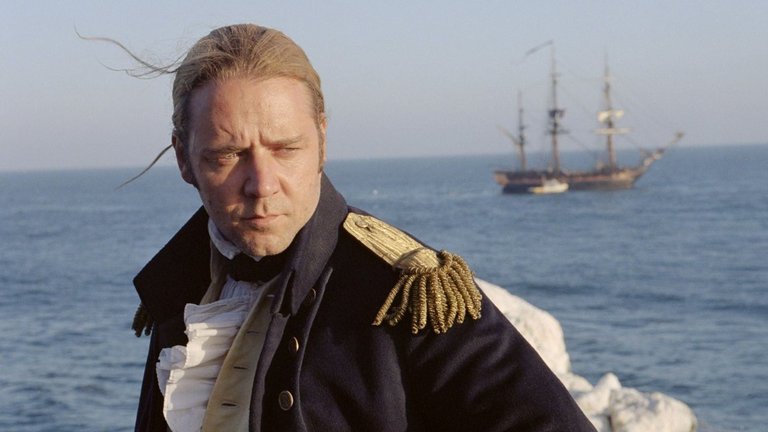Film Review: Master and Commander: The Far Side of the World (2003)

Every film is a product of its time. That includes even films that were intended to be anachronistic, like Master and Commander: The Far Side of the World, 2003 period war adventure film directed by Peter Weir, piece of cinema that looked to be more at home in Hollywood during first half of 20th Century than in its own time.
The film is based on popular Aubrey-Maturin series of nautical historic novels by British author Patrick O’Brian. The plot begins in 1805 during Napoleonic Wars when United Kingdom is fighting against France. Royal Navy frigate HMS Surprise is ordered to pursue, destroy or capture Acheron, French privateer that is endangering British commercial shipping on the world’s oceans. French ship is much bigger, faster and in any way superior to British ship whose commander Captain John “Jack” Aubrey (played by Russell Crowe) learns that the hard way during initial encounter near the coast of Brazil. HMS Surprise is heavily damaged during ambush and barely escapes, but Aubrey is determined to continue pursuit, because Acheron might wreak havoc on British whaling ships in Pacific. HMS Surprise sails around Cape Horn and comes near Galapagos Islands, where Stephen Maturin (played by Paul Bettany), ship’s surgeon and Aubrey’s best friend, prefers to stay in order to study local flora and fauna.
Made with the budget of over 150 million US$ and participation of three major studios (20th Century Fox, Miramax and Universal), Master and Commander was one of the most ambitious Hollywood films of its time. Expectations were high because of reputation of Australian director Peter Weir, known for highly regarded films with exotic settings, as well for presence of Russell Crowe, Oscar-winning star of historial epic Gladiator in main role. It also enjoyed favour of critics, which saw it as more serious alternative to similarly themed but more Hollywood-like Pirates of the Caribbean and embodiment of old school “larger than life” epics. Weir indeed does show great directing skill while disregarding swashbuckling action for more thoughful and methodical approach. Before actual action happens, audience has opportunity to meet characters and see unusually precise reconstruction of period that includes costumes, props, music, as well as showing logistics, tactics and other aspects of naval warfare at late 18th and early 19th Century.
Unfortunately, all that is framed by rather uninspired script, co-authored by Weir and John Collee, which tries compress richness of O’Brian’s twenty novels into too simplistic and, consequently, not that convincing story. Aubrey and Maturin are reduced to archetypes – the first, played by Crowe, into traditional macho man of action, very much like Kirk in Star Trek; the second, played by Bettany, into liberal intellectual and some sort of 19th Century Spock. Subplot dealing with Galapagos Islands and Maturin suddenly discovering interests for animals that would inspire Charles Darwin for his groundbreaking theories seems anachronistic and unnecessary distraction, an obvious implementation of 20th Century mindset into 19th Century story.
But even more problematic is scriptwriters’ intervention into the source material. The Far Side of the World, the novel upon which much of the script is based, is set during War of 1812 and has US frigate as protagonists’ main adversary. In years of chauvinistic hysteria following 9/11 it was simply impossible for Hollywood to make a film in which USA and its navy would be the antagonists. Instead, the frigate became French, which not only corresponded with Anglocentric view of Napoleonic era, traditionally promoted by Hollywood, but also by needs of early 21st Century propaganda. France, by refusing to join USA and its “noble crusade” to bring democracy to Iraq, has suddenly found itself on “the wrong side of history” and, for a brief moment, characterised by popular phrase “freedom fries”, and the French replaced Russians as the source of all evil in the world. From that perspective, Master and Commander, instead of being deliberately anachronistic, suddenly becomes much more anchored in its time that many other Hollywood films. Perhaps this was subconsciously recognised by the world public, which began to turn against US bellicose policies and found its reflection in slightly disappointing box office results. While Master and Commander still can be recommended to fans of naval adventures, O’Brian’s books or British television series Hornblower can serve as much better alternative.
RATING: 5/10 (++)
_
Blog in Croatian https://draxblog.com
Blog in English https://draxreview.wordpress.com/
InLeo blog https://inleo.io/@drax.leo
InLeo: https://inleo.io/signup?referral=drax.leo
Unstoppable Domains: https://unstoppabledomains.com/?ref=3fc23fc42c1b417
Hiveonboard: https://hiveonboard.com?ref=drax y
Bitcoin Lightning HIVE donations: https://v4v.app/v1/lnurlp/qrcode/drax
Rising Star game: https://www.risingstargame.com?referrer=drax
1Inch: https://1inch.exchange/#/r/0x83823d8CCB74F828148258BB4457642124b1328e
BTC donations: 1EWxiMiP6iiG9rger3NuUSd6HByaxQWafG
ETH donations: 0xB305F144323b99e6f8b1d66f5D7DE78B498C32A7
